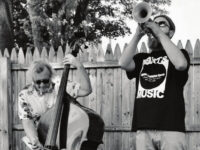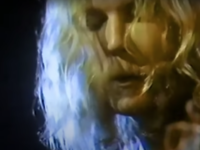I always think of the way-out multi-instrumentalist Rahsaan Roland Kirk, who passed away 31 years ago on Dec. 5, with a bunch of horns in his mouth. Yeah, he was an actual multi-instrumentalist.
It’s an iconic image, to be sure, but one that unfortunately seems to speak less anymore to virtuosity and as to a kind of cartoonish simplification of Kirk’s legacy.
For all his eccentricities (fitting a flute, for instance, with a trumpet mouthpiece, just to see what it would sound like), Kirk could be a staunchly sensitive interpreter. His was an undervalued genius in that he reached by turns for both inventiveness but also emotion.
Rahsaan Roland Kirk, it’s true, used standards as a diving board, but it was always clear to me that he trusted in their lasting truths. The photo, then, places too much emphasis on his heady experimentation through 1960s and ’70s sessions for Mercury and Atlantic, recordings where Kirk pushed himself to places of ecstatic creativity, in the style of John Coltrane and Sonny Rollins.
Kirk’s broader goal, before his untimely death from a stroke at just 41, was defining a black classical music — not just free jazz. Thus, his forays into reinterpreting contemporary soul from the period.
“Ain’t No Sunshine,” a pop song made famous by Bill Withers, was part of Kirk’s terrific Blacknuss album. As with 1968’s “Volunteered Slavery,” we find Kirk not so much presenting a rote rendition as lovingly pulling apart familiar sounds and rebuilding them with an angular eye. During a one memorable introduction to the title track, for instance, Rahsaan Roland Kirk said: “There are 52 white notes and 36 black notes on the piano. We’re going to play the black notes only, if you don’t mind.”
The original liner notes on “Ain’t No Sunshine” have Kirk simply playing the flute. But he’s singing along, wordlessly, at the same time — something that rekindles the deeply confessional feel of Withers’ hit song, even while retaining a fervent penchant for improvisation.
Rahsaan Roland Kirk skitters across the familiar lyric, then barrels through Withers’ compelling repetitive signature (“I know, I know …”), and later gets completely outside the structure of the tune through a series of yelps and cries, adding a new element of drama.
–Sample this soul favorite on Hommage a Nesuhi, a limited edition five-disc boxed set honoring producer Nesuhi Ertegun and the legendary artists he worked with over the years. It’s set for release on Dec. 15 on Rhino Handmade. The original session, which features a powerful string section overseen by Joel Dorn, also included Sonelius Smith at the piano, Billy Butler on guitar, Henry Pearson on bass, Khalil Mhrdi on drums, Richard Landrum on congas and Joe Habao Texidor on percussion.
- Nick DeRiso’s Best of 2015 (Rock + Pop): Death Cab for Cutie, Joe Jackson, Toto + Others - January 18, 2016
- Nick DeRiso’s Best of 2015 (Blues, Jazz + R&B): Boz Scaggs, Gavin Harrison, Alabama Shakes - January 10, 2016
- Nick DeRiso’s Best of 2015 (Reissues + Live): John Oates, Led Zeppelin, Yes, Faces + others - January 7, 2016





Pingback: Remembering Duane Allman's Brushes with the Jazz World